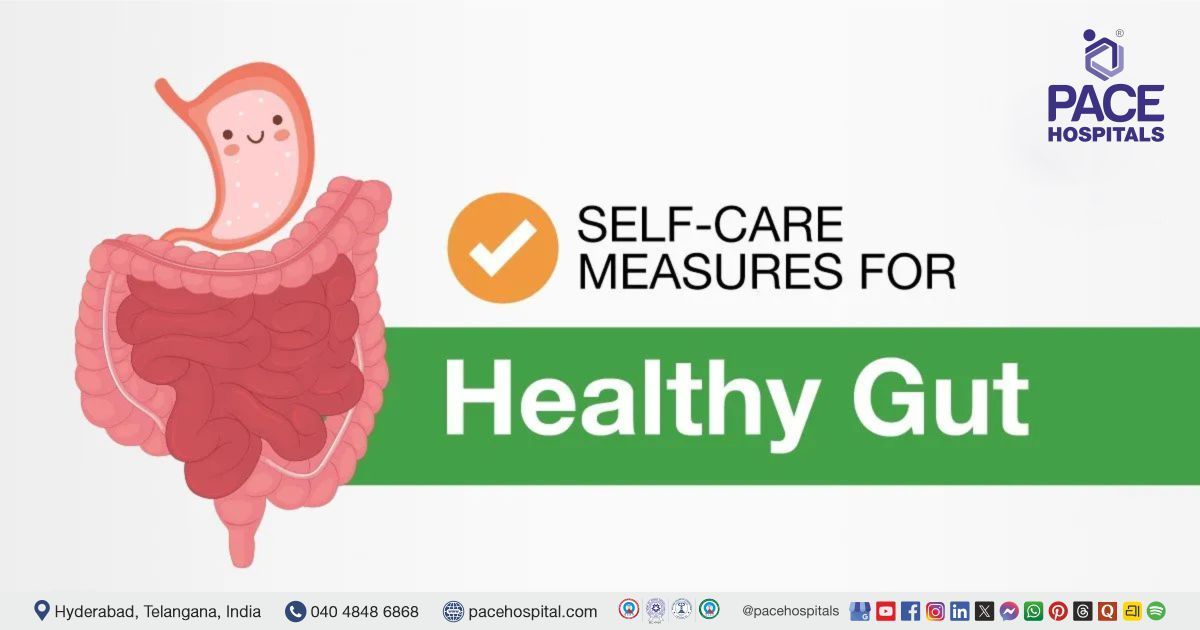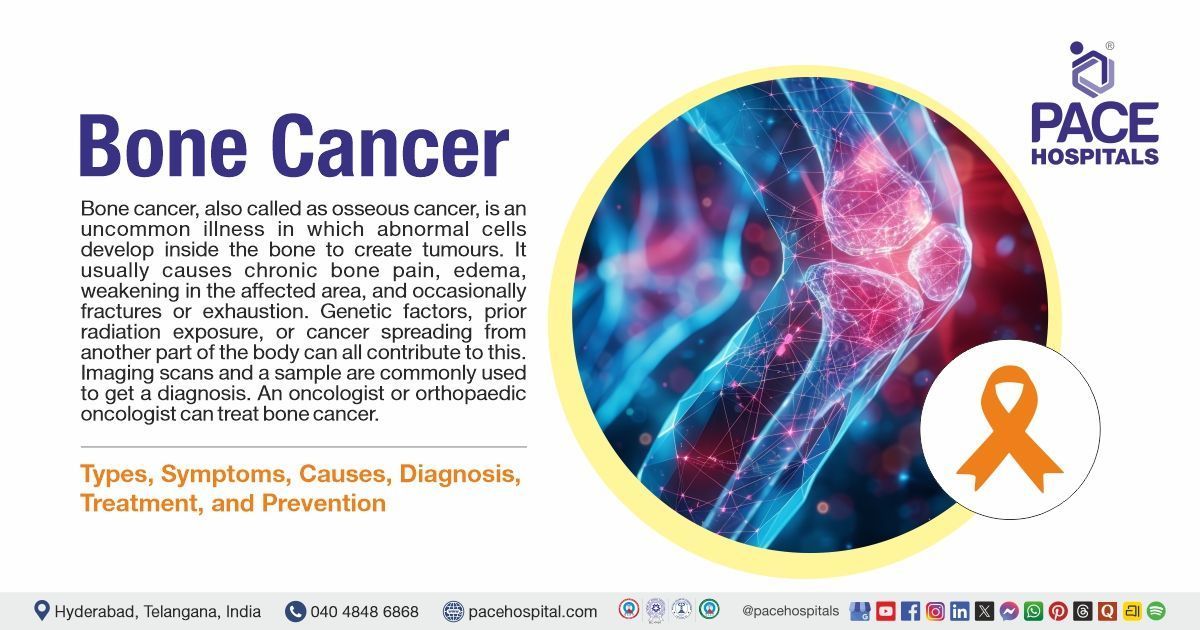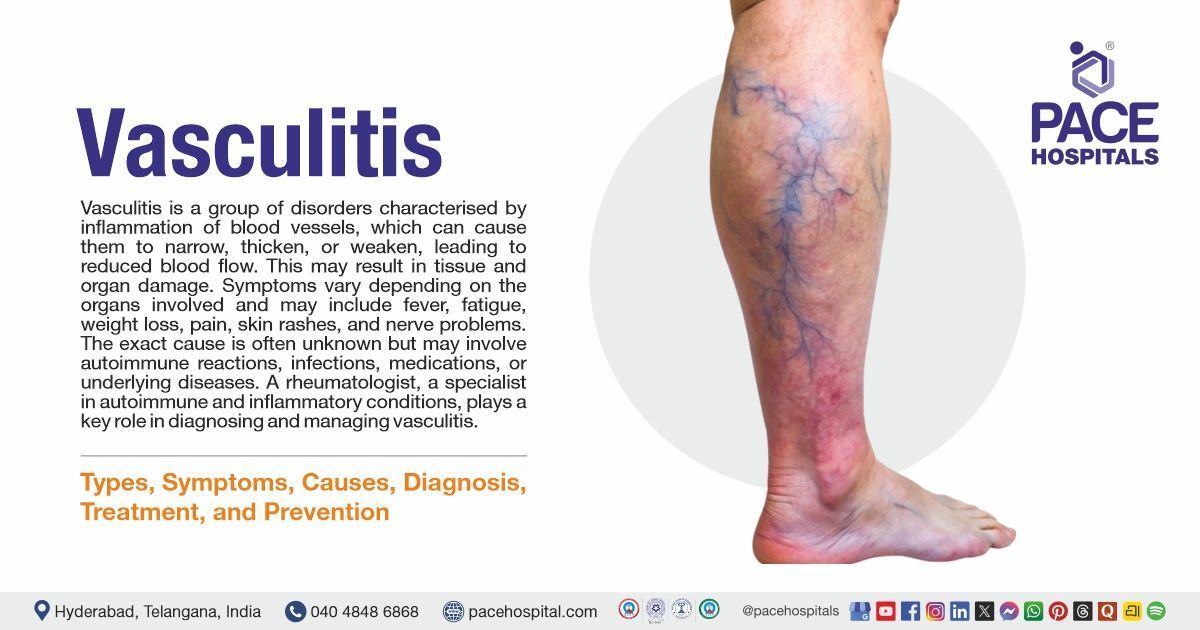10 Proven Ways to Improve Gut Health and Strengthen Immunity
PACE Hospitals
Written by: Editorial Team
Medically reviewed by: Dr. Govind Verma - Senior Consultant Gastroenterologist & Hepatologist
How to Improve Gut Health – Self-Care Tips
The gut—often called the "second brain"—plays a crucial role in maintaining overall health. It houses trillions of microorganisms called the gut microbiome, which influence digestion, immunity, and even mental well-being. When this microbiome is balanced, your digestive system functions smoothly; when it's disrupted, it can lead to issues like bloating, fatigue, inflammation, and poor immunity.
Let’s explore the science-backed and practical ways to improve gut health naturally through diet, lifestyle, and self-care strategies.
Understanding Gut Health
Your gut health refers to the state of your gastrointestinal (GI) tract and the diversity of microorganisms living within it. These microbes help break down food, absorb nutrients, and protect against harmful bacteria.
A healthy gut microbiome supports:
- Strong immune system
- Efficient digestion and nutrient absorption
- More clarity and a happier mood
- Reduced metabolic stability and inflammation
Conversely, poor gut health can trigger:
- Digestive issues (bloating, constipation, diarrhea)
- Weakened immunity
- Skin problems (acne, eczema)
- Mood disorders (anxiety, depression)
- Autoimmune and inflammatory diseases
Thus, taking care of your gut is not just about digestion—it’s about overall vitality and longevity.
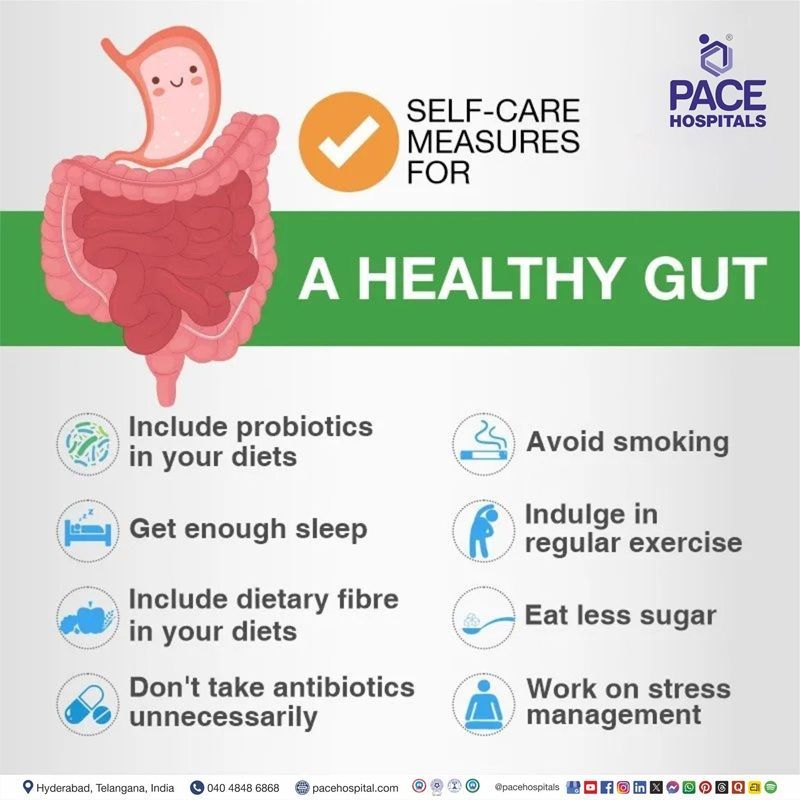
Simple Ways to Improve Gut Health Naturally
Some of the scientifically supported ways to improve gut health are as follows:
1. Include Probiotics and Fermented Foods
Probiotics are beneficial live bacteria that promote a balanced gut microbiome. They help restore healthy bacteria, especially after illness or antibiotic use.
Common Probiotic-Rich Foods:
- Yogurt and Buttermilk – Contain Lactobacillus and Bifidobacterium species.
- Cottage Cheese – Packed with natural cultures that support gut health.
- Kimchi and Sauerkraut – Fermented vegetables rich in lactic acid bacteria.
- Apple Cider Vinegar – Helps maintain gut acidity and supports digestion.
Fermented foods provide natural probiotics that boost gut flora, reduce inflammation, and aid bowel movement. Regular consumption supports long-term gut balance.
2. Add Polyphenol-Rich Foods
Polyphenols are plant compounds with antioxidant and anti-inflammatory properties. They support the growth and diversity of the good bacteria in your gut by acting as fuel for them.
Polyphenol-Rich Foods Include:
- Dark chocolate (70% cocoa and above)
- Red grapes and blueberries
- Almonds and walnuts
- Onions and broccoli
- Green tea and olive oil
Studies show polyphenols enhance microbial diversity and reduce harmful bacteria linked with chronic diseases like
diabetes and heart disease.
3. Eat Fibre and Prebiotics Daily
A fibre-rich diet supports digestion and helps beneficial bacteria thrive. Prebiotics—special types of plant fibres—act as food for probiotics.
Common Prebiotic Foods:
- Bananas and apples
- Garlic and onions
- Asparagus and leeks
- Legumes, beans, and whole grains
Probiotics that eat prebiotics produce short-chain fatty acids (SCFAs), which aid in controlling metabolism, lowering inflammation, and preserving colon health.
4. Limit Artificial Sweeteners
Artificial sweeteners may usually seem harmless, but they can disrupt gut microbiota balance. Excessive consumption of sweeteners such as aspartame or sucralose has been linked to:
- Alter gut flora composition.
- Reduce beneficial bacteria
- Impact insulin sensitivity and glucose regulation.
In moderation, use natural substitutes like stevia, jaggery, or honey. Harmony in digestion and metabolism is supported by maintaining balance.
5. Manage Stress for a Healthy Gut-Brain Connection
The gut-brain axis is a two-way channel that affects digestion and mood. This communication is disrupted by ongoing stress, which results in:
- Constipation or diarrhea
- Bloating or cramping
- Irritable Bowel Syndrome (IBS) symptoms
Stress-Management Techniques:
- Meditation and mindfulness
- Deep breathing exercises
- Regular stretching or yoga
- Listening to music or spending time in nature
Relaxing the mind calms the gut, improving motility and bacterial balance.
6. Regularly Exercise
Physical activity boosts gut microbial diversity and promotes bowel regularity. It also improves the production of short-chain fatty acids, which help fight inflammation.
Benefits of Regular Exercise:
- Promotes better digestion
- Improves metabolic health
- Decreases Type 2 diabetes and obesity risk
- Supports mental well-being
Keep a goal for at least 30 minutes of moderate exercise daily—including walking, cycling, swimming, or yoga—to enhance gut health.
7. Prioritize Sleep Hygiene
Quality sleep is essential for digestive and hormonal balance. Poor sleep can increase cortisol (stress hormone) levels, disrupting the gut microbiota.
Lack of Sleep Can:
- Trigger stress and inflammation
- Disrupt metabolism and appetite
- Reduce melatonin (affecting GI motility)
To improve gut and overall health:
- Get 7 to 9 hours of sleep every night
- Maintain consistent sleep timing
- Avoid caffeine and heavy meals before bedtime
Good sleep not only restores your body but also helps your gut heal and rejuvenate.
8. Restrict Smoking and Alcohol Intake
Both alcohol and nicotine can disturb gut flora, promoting the growth of harmful bacteria and damaging the intestinal lining.
Excessive use leads to:
- Gut permeability (“leaky gut”)
- Nutrient malabsorption
- Increased risk of liver disease and cancer
Reducing alcohol and quitting smoking helps the gut restore its natural microbial equilibrium and supports detoxification.
9. Use Antibiotics Responsibly
While antibiotics kill harmful bacteria, they also destroy beneficial ones. This imbalance can lead to diarrhea, candida overgrowth, and reduced immunity.
Take antibiotics only when prescribed and repopulate your gut afterwards with:
- Probiotic-rich foods
- High-fibre meals
- Hydration and rest
This ensures faster recovery of your gut microbiome.
10. Stay Hydrated
Water is important for digestion, but is often overlooked. It maintains the intestinal lining, facilitates the movement of nutrients, and aids in waste removal.
Tips for Hydration:
- Drink 8–10 glasses of water daily.
- Include herbal teas (mint, chamomile, ginger)
- Avoid excessive caffeinated or carbonated drinks.
Adequate hydration keeps digestion smooth and prevents constipation—a key factor in maintaining a healthy gut.
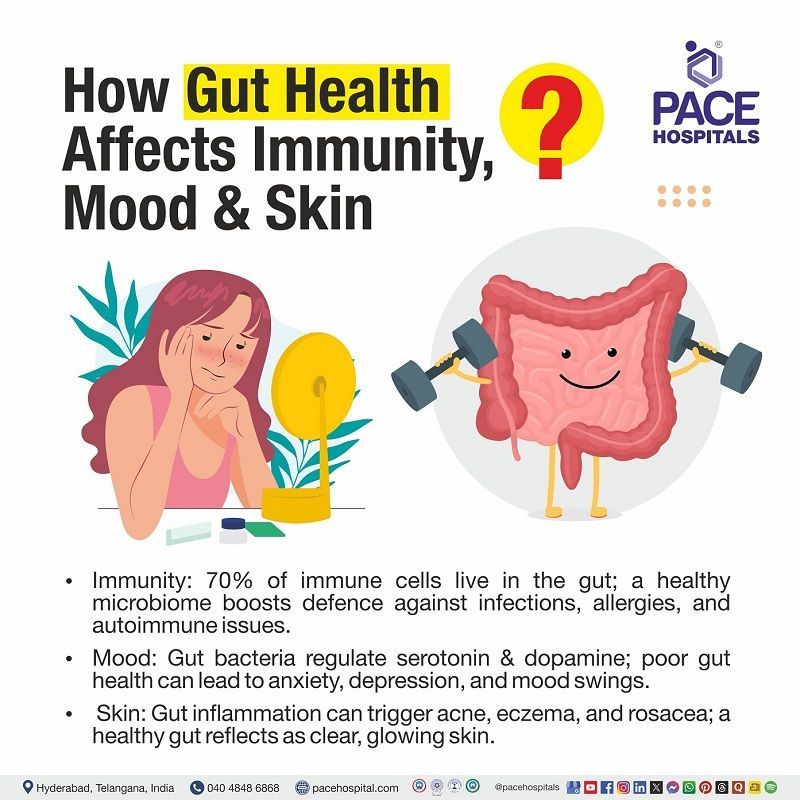
How Gut Health Impacts Immunity, Mood, and Skin?
A balanced gut doesn’t just help your stomach—it supports your entire system.
Gut and Immunity
The gut contains about 70% of immune cells. A healthy microbiome helps the body fight infections, allergies, and autoimmune diseases.
Gut and Mental Health
Gut bacteria influence neurotransmitters like serotonin and dopamine. Anxiety, depression, and mood swings can result from an unbalanced gut.
Gut and Skin Health
Gut inflammation can manifest as skin conditions such as acne, eczema, and rosacea. A clean gut often results in clearer, glowing skin.
Hence, improving gut health can transform the energy levels, mood, skin, and overall vitality.
PACE Hospitals’ Insight
At PACE Hospitals, Hyderabad, we emphasize gut-centric wellness as the cornerstone of general health. Our experts in gastroenterology, hepatology, and nutrition guide patients through personalized care plans focusing on diet, probiotics, and lifestyle changes.
A strong gut is the foundation of preventive healthcare—and small daily actions can make a big difference.
Frequently Asked Questions (FAQs) on Gut Health
What are the first signs of an unhealthy gut?
Common signs include bloating, constipation, diarrhea, fatigue, skin rashes, food intolerances, and low immunity. These indicate an imbalance in gut bacteria or inflammation in the intestinal lining.
How long does it take for gut health to improve?
Within three to four weeks, observable improvements might be seen with regular dietary and lifestyle adjustments. However, depending on specific circumstances, full microbiome restoration could take up to 3 months.
Are probiotics safe for everyone?
Yes, probiotics are generally safe for most of the individuals. However, those with severe immune conditions should consult a gastroenterologist before taking supplements.
Does fasting help gut health?
Intermittent fasting may promote microbial diversity and allow the gut time to rest and repair. However, long or extreme fasting should be done under medical supervision.
Can stress really affect digestion?
Absolutely. Stress releases cortisol and adrenaline, which can slow digestion, alter gut motility, and disrupt the balance of beneficial bacteria.
What foods should I avoid for a healthy gut?
Avoid ultra-processed foods, refined sugars, artificial sweeteners, excessive red meat, and alcohol—these can disturb the gut microbiome.
Is yoghurt enough as a probiotic source?
Yoghurt is a good start, but for optimal results, combine it with other fermented foods like kimchi, kefir, and sauerkraut to diversify gut bacteria.
Can antibiotics permanently damage gut bacteria?
Most gut bacteria recover after antibiotic use, but it may take several weeks. Supporting your diet with probiotics and prebiotics helps restore balance faster.
How does exercise help the gut?
Exercise improves digestion and controls inflammation by increasing circulation, lowering stress hormones, and fostering good bacteria that produce short-chain fatty acids.
Why is gut health linked to immunity?
Since most immune cells reside in the digestive tract, maintaining a healthy gut helps the immune system respond effectively to pathogens and allergens.
Final Thoughts
Improving gut health isn’t about a quick fix—it’s about building consistent, mindful habits. Nourishing your gut with real foods, movement, hydration, rest, and calmness can lead to long-lasting wellness.
A happy gut equals a healthier, stronger, and more energetic you.
Share on
Request an appointment
Fill in the appointment form or call us instantly to book a confirmed appointment with our super specialist at 04048486868

